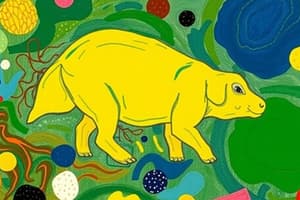Podcast
Questions and Answers
What is the primary role of the kidneys in human bodies?
What is the primary role of the kidneys in human bodies?
- Generating tears to regulate body temperature
- Filtering blood and removing waste materials (correct)
- Digesting food and absorbing nutrients
- Producing sweat to eliminate waste products
Which of the following is NOT a route of excretion in human beings?
Which of the following is NOT a route of excretion in human beings?
- Sweat
- Vomit
- Saliva
- Tears (correct)
What is urea mainly composed of in human urine?
What is urea mainly composed of in human urine?
- Proteins and carbohydrates
- Water and amino acids
- Amino acids and other solutes (correct)
- Water and lipids
Why is the regulation of kidney efficiency important in waste removal?
Why is the regulation of kidney efficiency important in waste removal?
Which bodily function is directly related to the elimination of metabolic waste products?
Which bodily function is directly related to the elimination of metabolic waste products?
What is one of the roles of the large intestine in excretion?
What is one of the roles of the large intestine in excretion?
Why can't plants directly eliminate nitrogenous compounds?
Why can't plants directly eliminate nitrogenous compounds?
What is the purpose of converting nitrogenous waste products in plants into nitrate?
What is the purpose of converting nitrogenous waste products in plants into nitrate?
Why are carbon dioxide release and sugar storage not considered forms of excretion in plants?
Why are carbon dioxide release and sugar storage not considered forms of excretion in plants?
How does excretion contribute to maintaining overall health in organisms?
How does excretion contribute to maintaining overall health in organisms?
Flashcards are hidden until you start studying
Study Notes
Life Processes: Excretion
Excretion is one of the essential life processes shared by all living organisms. It involves the elimination of metabolic waste products from the body. This process helps maintain homeostasis within the organism, supporting its overall health and survival. In this section, we will explore how excretion functions in various organisms, including humans and plants, and discuss the different mechanisms involved in this vital biological function.
Human Excretion
In human beings, most of the wastes created during cellular respiration are eliminated through urine and feces, which are produced by the kidneys and large intestines respectively. Other routes of excretion include sweat, tears, saliva, and occasionally vomit. These waste products are either directly toxic or indirectly harmful if they accumulate in the body beyond certain limits.
Kidney Function
The primary role of the kidneys in human bodies is to filter blood and remove waste materials from it. They produce urine, which consists mainly of water, urea, and other dissolved solutes. Urea is a compound formed when amino acids break down during protein synthesis. Since muscle mass varies greatly between individuals, so does the amount of urea produced daily. As a result, the kidneys must regulate their efficiency to filter out the appropriate amount of waste products while conserving water.
Large Intestine Function
The large intestine, specifically the colon and rectum, play a crucial role in excretion by retaining fluids and absorbing electrolytes, water, and vitamins such as vitamin K and biotin. This absorption process helps maintain the balance of water and minerals within the body. In addition, some bacteria present in the colon break down cellulose into formate and methane gases, which contribute to flatulence.
Plant Excretion
While plants do not possess specialized organs like kidneys in animals, they still undergo processes similar to excretion. Plants absorb nutrients through their roots and synthesize proteins, carbohydrates, and lipids essential for their growth and reproduction. However, plants cannot eliminate nitrogenous compounds directly because they lack the enzyme urease. Instead, they convert nitrogenous waste products into ammonium ions, which combine with phosphorus to form nitrate, a compound that can be taken up by plant cells once again.
Plants also release carbon dioxide through photosynthesis and other metabolic pathways, although these are not considered forms of excretion since they are involved in maintaining homeostasis rather than eliminating toxic substances. Additionally, some plants store excess sugars in their vacuoles, which can be seen as a storage method similar to how animals store extra energy in fat cells.
In conclusion, excretion is an important life process that plays a critical role in maintaining proper physiological function and overall health in both humans and plants. It involves the removal of waste products and maintenance of water and mineral balance, ensuring that organisms operate efficiently and sustainably. Understanding the specific mechanisms behind excretion can help researchers develop new strategies to improve healthcare and agricultural practices.
Studying That Suits You
Use AI to generate personalized quizzes and flashcards to suit your learning preferences.




